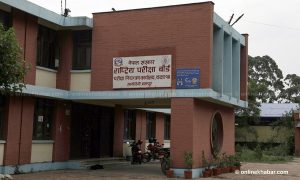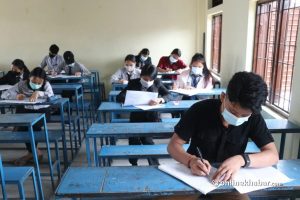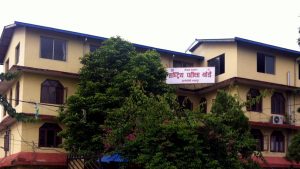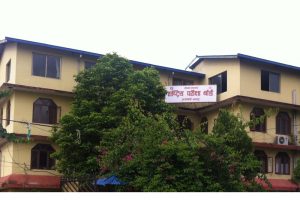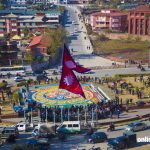If it had been any other year, the National Examination Board would have already been published grade 12 final examinations by this time of the year. However, this year, the board has just published the schedule. The exams could have been held in April if there had not been the Covid-19 pandemic.
It is not only the dates that have been changed. Citing the pandemic, the board has introduced a whole new procedure to conduct these exams this year. As per the (Class 12) Student Evaluation, Examination Operation, Management, Documentation and Certification Working Procedure made public by the board, the 12th graders will be partially evaluated on the basis of the marks obtained by them in the grade 11 last year. Likewise, internal evaluations by the schools have also been given significant weight.
Educationists, teachers, and students have mixed views on this new modality. Whereas the proposed model is likely to help the country’s examination system improve and students feel better amid the pandemic, they have also expressed serious concerns over some provisions.
Burden of written tests: added or reduced?

As per the working procedure, the students will be required to sit for just 40 per cent of the evaluation scheme. The other 40 per cent will be calculated based on their previous year’s score in the same subject whereas schools will be authorised to evaluate the students on their own for the remaining 20 per cent.
Whereas the board would evaluate the students’ performance solely in three hours of the exam in the previous years, it is the basis for just 40 per cent of the score this year. Likewise, the written examination will last one and a half hours only.
Yubaraj Sapkota, a teacher at Canvas College in Kathmandu, says the reduced time will not have any good impacts. “Actually, conducting written exams for only 40% of the full mark is not a good practice when we have already prepared them for 100 marks. Now, the students have to study the entire course for just 40 marks giving them more stress.”
Similarly, Anisha Basnet, a management student at Kastamandap College in Kathmandu thinks, “It’s rubbish. For just 40 marks, reading the whole syllabus is not fair.”
“Instead of solving our problem, this new model is more like a burden. I don’t think I’m gonna read the whole syllabus for just 40 marks.”
Meanwhile, Amnusha BC, another management student at Everest Innovative College, does not find any logic in reducing the exams from 100 marks to 40 and from three hours to its half. “It doesn’t make any difference in the level of risk of coronavirus transmission,” she says.
The board’s former examination controller Santosh Aryal partially agrees with BC. He is for conducting 100-mark written exams by the board in key subjects and letting schools internally evaluate the students for minor subjects.
“I had suggested taking written examinations for full marks for key subjects such as physics, chemistry, biology, and mathematics for science stream; account, economics and business maths for management stream; and child and development learning, health and physical education for education. For the rest, there could be internal assessments also.”
However, with the proposed model of dividing the exam of each and every subject into external and internal exams does not improve anything.
Educationist Mahashram Sharma has different views. “By conducting a written examination within one and a half hours, the board will be able to conduct the examinations in two shifts and wrap up the examination in a short time. This way, the students do not have to stay long.”
Although Sharma says so, the board has not planned to conduct the exams in two shifts.
Double punishment for one mistake

According to the board’s working procedure, if there are subjects that the students had not studied in the previous year, the 40 per cent allocated to the grade 11 exams will be calculated on the basis of the average of their scores in all subjects last year.
Amnusha BC finds this system inappropriate. “I am studying business maths this year which was not in our course last year. How can they evaluate my competence in mathematics on the basis of my previous year’s score given than I did not study it last year?” she says, “It’s unfair.”
Anisha Basnet shares similar views. She asserts. “It is inappropriate. I had not been able to do my 11th-grade exams better, but I am determined to improve my score this year. I have already started working hard for this,” she says, “But, with the new model into existence, I am hopeless that my hard work would not pay off.”
Basnet says there are many students like her who could not do well last year but were hoping to improve this year.
Ramesh Dhakal, an English teacher of a Kathmandu-based school, also finds this idea wrong. He says a student’s score in a three-hour examination is affected by many factors including the students’ health condition on that particular day and the environment in the exam hall.
He questions, “If a student had scored low marks due to these circumstances in the 11th final examinations, should they face the consequence again in the 12th grade also?”
Dhakal says he has seen many students who had failed the 11th-grade examinations but later stood first in the 12th-grade examinations.
Chandra Mani Poudel, the board’s chairperson, however, claims, “But, it can also be possible that a student who has done well in the grade 11 exams can perform badly in the grade 12 exams as it could be another way around as well. That is why the board has allocated 20 per cent marks from internal assessment considering the current circumstances brought by the pandemic.”
He is of the view that the 20 per cent internal evaluation can make a balance.
Educationist Mahashram Sharma also views that there is no problem with adding 40 per cent marks from the grade 11 examinations as both the grades have been considered interrelated.
Honesty in internal evaluation

As Paudel says, another major provision proposed in the working procedure is that 20 per cent of marks will also be evaluated on the basis of the internal assessment of the students by the school. Whereas everyone agrees about the relevance of the provision, some question if the schools and teachers honestly judge their students.
Amnusha BC says, “We have recently seen how the schools evaluated their students in this year’s Secondary Education Examinations (the 10th-grade final examinations.” When the board published SEE results on August 17, stakeholders had questioned the honesty of teachers as the number of students scoring higher grades was way more than that of previous years.
But, teacher Ramesh Dhakal views that the weight of internal evaluation should further increase to 60 per cent. However, he says he is also aware that if the schools and teachers are not honest, it would have long-term consequences on the students.
Dhakal also offers a solution. “There is the practice of controlling this by evaluating the ratio between the marks of internal and external examinations in many parts of the world. I mean to say internal marks should be proportional to external marks.”
Ray of hope
Amnusha BC, however, is happy that the board at least innovated this model to save the students from losing the entire academic year. Due to her concern that she might not be able to join a chartered accountancy course in this session after passing the exams, she could not concentrate on studies in these seven months. That uncertainty has ended now.
Likewise, Ramesh Dhakal views, “Although late, this decision has given relief to thousands of students about the uncertainty regarding their exams.”
On the other hand, former controller Santosh Aryal feels that postponing the examinations in April was a big mistake by the government as there were not many active cases of the coronavirus infection then. However, as of now, conducting examinations has been a must to keep the academic calendar running as it has been too late by now.







